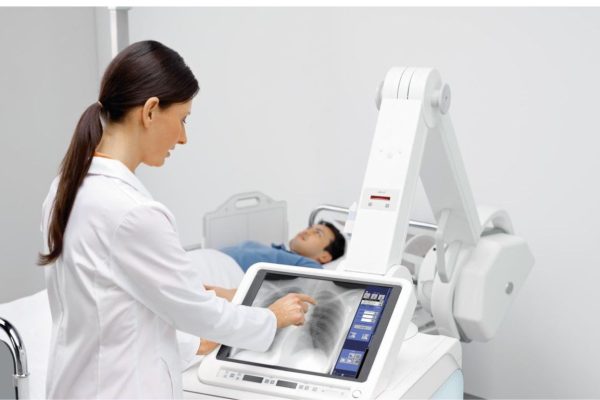High Frequency digital X- ray

High Frequency digital X- ray
High-frequency digital X-rays, also known as digital radiography, represent an advanced form of X-ray imaging technology. They utilize digital detectors to capture images of the body’s internal structures, similar to traditional X-rays but with several significant advantages:
High-frequency digital X-ray technology has become increasingly prevalent in medical settings due to its numerous advantages over traditional film-based radiography. It’s used in various medical specialties such as orthopedics, dentistry, cardiology, and general radiology to diagnose fractures, detect abnormalities, monitor treatments, and guide surgical procedures.
Despite the benefits, it’s important to note that digital X-rays still involve exposure to ionizing radiation, and appropriate precautions are taken to minimize patient exposure according to established safety guidelines.
Here Are Some Services Include !
IVP stands for Intravenous Pyelogram, which is a medical imaging procedure used to examine the kidneys, ureters, and bladder. It involves injecting a contrast dye into a vein, usually in the arm, which travels through the bloodstream and collects in the kidneys.
IVU, on the other hand, typically stands for Intravenous Urography, which is an older term used interchangeably with Intravenous Pyelogram (IVP). Both refer to the same procedure of imaging the urinary system using contrast material and X-rays.
Both RGU and MCU are valuable diagnostic tools used by healthcare professionals, especially urologists, to assess various conditions affecting the urinary system, such as strictures, blockages, or abnormalities that might affect urine flow. These procedures can provide crucial information for diagnosing and planning appropriate treatment for urinary tract issues.
HSG stands for Hysterosalpingography, which is a diagnostic imaging procedure used to evaluate the uterus and fallopian tubes in women who are having difficulty conceiving or experiencing recurrent miscarriages.
Hysterosalpingography helps identify conditions such as blocked fallopian tubes, uterine abnormalities (like uterine fibroids or polyps), or issues with the shape of the uterine cavity that might affect a woman's ability to conceive or carry a pregnancy to term.
A T-tube cholangiogram is a medical procedure performed to visualize the bile ducts in the liver and the flow of bile following a surgical procedure called a choledochotomy.
A T-tube cholangiogram is a medical procedure performed to visualize the bile ducts in the liver and the flow of bile following a surgical procedure called a choledochotomy.
A barium study, also known as a barium contrast study or contrast radiography, is a diagnostic procedure that uses barium sulfate, a contrast medium, to visualize and examine the gastrointestinal tract. These studies help diagnose various gastrointestinal conditions such as ulcers, tumors, strictures, inflammatory bowel disease, hernias, or other structural abnormalities affecting the digestive system. The images obtained during the barium study provide valuable information to healthcare providers for diagnosis and treatment planning.
Why Choose us?
Choosing us over other, Navya Diagnostics have such world class facilities and doctors which you won’t get anywhere.
This hospital is not only a treatment center, in fact it’s a hope for many. We do our best in treating the patients. We know what the requirements of a patient are and to reduce extra burden, we keep working for their good health and quick recovery.
w
We gives you the best healthcare solutions.
If you have any query or want to share problems or any emergency, contact us without hesitation..
